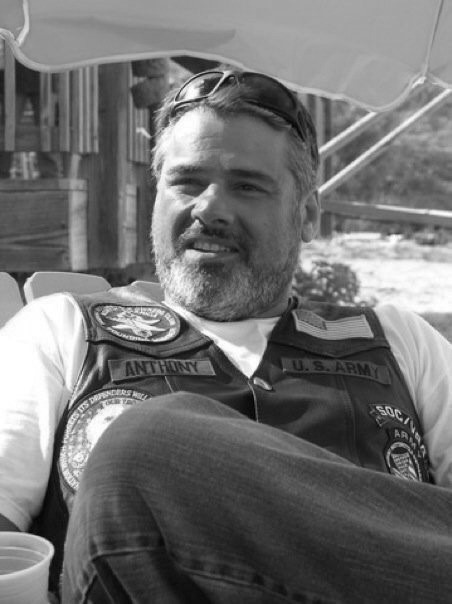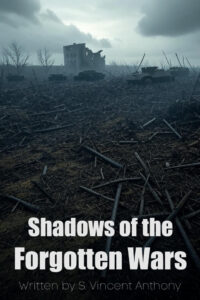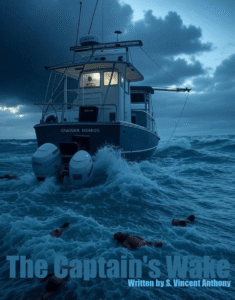 I’m Gina Anthony, Vincent’s wife, and I want to share with you what makes my husband’s stories so powerful. Vincent’s work dives deep into the hearts and minds of veterans, showing the heavy toll war leaves behind. His vivid writing, thoughtful structure, and unforgettable characters pull you into their world, making you feel the weight of their struggles and the society that often turns its back on them.
I’m Gina Anthony, Vincent’s wife, and I want to share with you what makes my husband’s stories so powerful. Vincent’s work dives deep into the hearts and minds of veterans, showing the heavy toll war leaves behind. His vivid writing, thoughtful structure, and unforgettable characters pull you into their world, making you feel the weight of their struggles and the society that often turns its back on them.
1. The Heart of His Stories: War’s Lasting Wounds
Vincent’s tales focus on the emotional scars of combat, especially from Vietnam, though he weaves in echoes of World War II and Korea too. He doesn’t just talk about PTSD as some clinical term—it’s a raw, all-consuming force that breaks people and their connections to others.
 In “Shadows of the Forgotten Wars“, you meet Elias Thorne, a veteran haunted by Normandy, Chosin Reservoir, and Vietnam. A simple sound, like a car backfiring, yanks him back to the roar of a Panzer in Normandy. Society’s cruelty—calling Vietnam vets “baby killers”—cuts him off from the world. He finds a bit of comfort in stray animals, but even that can’t save him from a lonely end.
In “Shadows of the Forgotten Wars“, you meet Elias Thorne, a veteran haunted by Normandy, Chosin Reservoir, and Vietnam. A simple sound, like a car backfiring, yanks him back to the roar of a Panzer in Normandy. Society’s cruelty—calling Vietnam vets “baby killers”—cuts him off from the world. He finds a bit of comfort in stray animals, but even that can’t save him from a lonely end.
 In “The Captain’s Wake“, you’ll follow Jack Harlan, wrestling with what he calls an “itch”—a violent urge born in Vietnam. Something as small as a client’s taunt can morph into a Viet Cong interrogator’s face, pushing him to kill. His story ends in prison, confessing in a haze before fading away.
In “The Captain’s Wake“, you’ll follow Jack Harlan, wrestling with what he calls an “itch”—a violent urge born in Vietnam. Something as small as a client’s taunt can morph into a Viet Cong interrogator’s face, pushing him to kill. His story ends in prison, confessing in a haze before fading away.
Vincent keeps coming back to themes like society’s coldness toward veterans, the pointlessness of just surviving war, and images like the sea or jungle to show the chaos inside his characters. His endings don’t wrap things up neatly—they’re heavy, leaving you with the truth that war often wins over peace.
2. How He Builds the Story: A Slow, Steady Climb
Vincent tells his stories in a straight line, chapter by chapter, usually starting with a prologue that sets the historical scene and ending with an epilogue that leaves you thinking about what it all means.
- “Shadows of the Forgotten Wars“ kicks off with a dedication to Vietnam heroes and a first chapter that feels like a prologue, introducing Elias coming home. It follows him through decades, ending with his quiet death in the epilogue.
- “The Captain’s Wake“ starts with a 1972 prologue, showing Jack fresh from Vietnam. You watch his violence grow over the years, and the epilogue finds him reflecting in prison before he’s gone.
He weaves in flashbacks so smoothly—maybe a sound or smell pulls a character back to the battlefield—that you feel the inevitability of their pain. The pacing is careful: slow when characters are lost in thought, but fast and gripping during moments of crisis, like when Jack’s murders unfold step by tense step.
3. His Words: Painting Pictures You Can Feel
Vincent’s writing is so vivid it pulls you right in, mixing the physical world with the characters’ inner turmoil to create something haunting.
- Sights and Sounds: In “Shadows,” rain “lashed the small town… a relentless deluge that mirrored the storm in Elias’s soul.” In “Captain,” you can almost see the blood spraying in a “hot arc, painting the deck crimson” and smell the “acrid scent of cordite and fear.”
- Metaphors: He describes war memories like they’re sieges or heavy blankets. In “Shadows,” memories are a “suffocating shroud”; in “Captain,” the Gulf becomes a “silent graveyard.”
- Sentence Flow: Vincent uses long, flowing sentences to build deep emotions, especially in flashbacks, but then hits you with short, sharp ones for impact—like “The itch exploded” when Jack kills.
His tone is heavy, almost mournful, and he doesn’t sugarcoat things. Redemption is rare. Elias gets a moment of peace with his strays, but it doesn’t last. Jack only feels “peace” when he’s lost to violence.
4. His Characters: Broken but Human
Vincent’s main characters are veterans you can’t help but root for, even when they’re flawed. Their trauma drives them, not some innate evil, and that makes you care about them, even in their darkest moments.
- Elias in “Shadows” feels like a “ghost in his own life.” His stray dogs, Max and Luna, give him a flicker of hope, but guilt and rejection from the world crush him.
- Jack in “Captain” starts out wanting a normal life, but his trauma-fueled “itch” turns him into a killer. Through flashbacks, you see his pain, so his fall feels tragic, not monstrous.
Other characters, like Sarah in “Shadows” or Maria in “Captain,” try to offer love, but they can’t break through the walls war built around these men. These women are kind but powerless against the past.
5. Tying It to the Real World
Vincent roots his stories in history, quietly calling out how America treated its veterans without preaching.
- “Shadows” shows the 1950s to 1970s, with details like the poor support from the VA or the sting of anti-Vietnam protests. Events like the 1975 fall of Saigon anchor the story in time.
- “Captain” tracks Jack’s breakdown alongside Cape Coral’s growth, from a shady 1950s land deal to an 1980s boom, mirroring bigger changes like economic struggles or media pressure.
This makes the stories feel real, showing how war’s pain lingers far beyond the battlefield, made worse by a society that turns away.
6. The Mood and What Shaped Him
Vincent’s stories are dark and poetic, with a sense that war’s shadow never lifts—no heroes, no happy endings. You can feel the influence of writers like Hemingway, with his quiet emotional depth, or Tim O’Brien, who captured Vietnam’s raw trauma, but Vincent’s voice is richer, more descriptive. His stories are novella-length, feeling like pieces of bigger novels, focusing on slow decline rather than one big moment.
Final Thoughts
Vincent’s stories are unflinching looks at what war does to people. His vivid words and careful storytelling make you feel for these broken veterans while showing the wounds that never heal—both from battle and from a society that fails them. His work is literary but approachable, pulling you into a poignant reflection on trauma’s lasting grip.
Press Biography
S. Vincent Anthony is an American writer renowned for his poignant novels that delve into the enduring impacts of war, trauma, and human resilience, often centered on the experiences of veterans and their families. Born in 1967 at Prince George’s Hospital in Bladensburg, Maryland, Anthony grew up in Fairfax, Virginia, and later Clearwater, Florida, where he absorbed the rich cultural tapestry of the state’s coastal communities.
Coming from a family with a deep military legacy, Anthony’s father and both uncles were lost to the Vietnam War, a tragedy compounded by the loss of his grandmother, who also succumbed to the war’s toll. Every generation on his father’s side served in the United States Army, with relatives having fought in World War II, the Korean War, and the Vietnam War. This heritage, marked by profound loss, deeply shaped his perspective, infusing his writing with authentic insights into the sacrifices and psychological burdens borne by soldiers and their loved ones.
After graduating from West Springfield High School in Virginia, Anthony followed in his family’s footsteps, enlisting in the U.S. Army immediately after high school. His military service provided firsthand understanding of the complexities of combat and its aftermath, themes that resonate throughout his literary work.
Anthony’s novels, including The Captain’s Wake (1996), Through the Lens (1995), Shadows of the Forgotten Wars (2007), Shadows of the Unseen (2009), and Echoes of the Fallen (2013), are celebrated for their raw emotional intensity and suspenseful narratives, offering unflinching portrayals of post-war struggles and the intergenerational scars of conflict.
He is married to his wife, Gina Anthony, and they have two sons. Residing in Florida, Anthony continues to write and champion veterans’ causes, drawing inspiration from his family’s storied military history and the profound losses they endured.